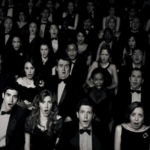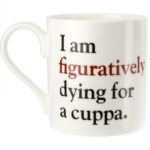Talk the talk
With the practical season now over we’re entering the period of regular winter beekeeping talks and weekend conventions†. For five or six months the closest many of us will get to bees is a draughty church hall with a cup of tea at the end.
And a chocolate digestive biscuit if the Association Secretary has managed to get everyone to pay their subs.

What? No chocolate?
Listening
I enjoy these events. There’s a healthy, competitive camaraderie to the conversations before and after the talk …
How was your season?
80lb? Per colony? Or in total?
Didn’t lose a swarm all season!
… and so on. The old-timers smile knowingly and keep quiet about the best sites, the ‘newbees’ enthusiastically recount the ups and downs of their first season and those on the beginners course this winter simply try and work out what the heck a ‘Demaree’ is.
During the talk the lights are dimmed. We all peer through the gloom at a slightly skewwiff image projected onto the cream-painted wall which has a picture hook irritatingly visible just left of centre.
The old boy in the fifth row falls asleep and starts snoring gently.
Forty-five to fifty minutes flies by, the lights come up and there’s an opportunity for questions. By this time everyone is gasping for a cuppa or the loo, or both, so appreciation is shown “in the usual manner” and the formal part of the evening draws to a close.
Drinking
Tea is brewed, biscuits are scoffed. Now is the time to ask the question you wish you’d asked at the end of the talk – either of the speaker or of the more experienced ‘beek’ (and in my experience there are always more experienced beekeepers at these things) sitting next to you.
Friendships are re-established, new contacts are made, recipes are exchanged and tips and tricks are offered.
The audience breaks up into little groups discussing honey or queen rearing or the upcoming sale at Maisies. People drift away. The Secretary scurries round trying to get the usual suspects to pay the subs that have been due since last January (which is why there weren’t any chocolate digestives). Cups are washed, the library is packed away and the hall locked up.
But it’s not over yet … twos and threes loiter in the car park where the real gossiping occurs. Unless it’s snowing. Who’s been buying in imported colonies or queens for selling on as “local”? How many times has ‘Fred’ recycled that winning jar of clover honey in the show? Which farmers will be growing borage next year?

Ah! That’s better
Talking
I enjoy these as well. I usually end up getting invites to present at just about the same number of talks I manage to attend at my own associations each winter. Some are round the corner or pretty local, others are at the other end of the country. I was recently excellently hosted by the Devon BKA (~500 miles away) and presented at a meeting in Chillán (~7500 miles away) of Chilean beekeepers in March.
With the exception of these long-distance trips the process is pretty similar. The satnav is programmed with the venue details. The bag is checked for the laptop and every possible connector that might be needed. A spare copy of the presentation is carried on a memory stick ‘just in case’. The car is loaded with any additional stuff used in the presentation (nothing for a science talk, but lots for talks on practical beekeeping).
I set off later than intended but earlier than needed. There’s almost nothing worse than turning up late. I find the venue, park nearby in the dark, locate the draughty church hall‡ and the Secretary lurking in wait for early arrivers (who haven’t paid their subs yet).
The laptop is set up, the projector checked and the screen/image is levelled as the audience dribbles in. Old friends say hello. The lights are dimmed and we’re off!
The reflection from the screen casts an eerie light across the audience. Faces in the front couple of rows are clear and bright. Those further back are more like a grainy black and white image. Expressions are more difficult to see. Are they still following this? Am I going too fast? Too slow?
Laughing
I chuck in a joke or anecdote to liven things up. That’s better. Or not. My jokes aren’t good.
A particularly pale slide casts a brighter reflection deeper into the crepuscular gloom at the back of the hall.
The old boy in the fifth row who has been gently snoring for the last 15 minutes can now be heard and seen.
I gallop towards the end, thanking the organisers, my research team, those who gave us the money to do the work and the beekeeping associations we’re privileged to be working with.
Mild applause … someone nips out to turn the urn on.
Questions
These are by far and away the best bit. As a speaker it’s how I judge how successful I was at getting the message across.
Questions range from simple and straightforward to long, rambling and exquisitely complicated.
All are welcome.
Not all can be answered.
Simple questions about things I’ve covered, albeit quickly or as a peripheral point, are easy to answer and I make a mental note to deal with the subject better in the future (or avoid it for clarity).
Difficult questions about things I’ve covered may require a longer answer, more thought or a cup of tea. Inevitably, some topics are outside the experience or interest of most of the audience. A detailed explanation of molecular biology (science) or long-winded discussion of grafting tools (queen rearing) needs to be postponed …
“Let’s discuss that over a cup of tea and a chocolate digestive” … the latter said hopefully.
Questions about things unrelated to my talk are not unusual. Long, rambling and exquisitely convoluted questions about a totally different topic are sometimes asked. There’s a direct relationship between the number of people wanting to ask questions and the length, ramblingness, and distance off-topic of these types of questions.
I usually hope the Association Secretary or Chair steps in at this stage and announces that tea is ready.
Experience
As a scientist I’m used to talking at conferences where the audience ranges from undergraduate students to internationally-renowned Emeritus Professors. As a beekeeper I’m well aware that the audience at Association events may include the full spectrum of experience and abilities … from those on the winter “Introduction to Beekeeping Course” to some who earn a living beekeeping.
I’m also well aware that the old boy in the fifth row who gently snored through my entire talk is probably just knackered having spent whole the day extracting 500 lb of heather honey.
Which is almost, to the ounce, 500 lb more than I got 😉
All he came for was a cup of tea and a chocolate digestive biscuit.
The end
I pack up the cables and the laptop, say my goodbyes, weave my way through the little groups in the car park gossiping about the price of Api-Bioxal or where to buy cheap fondant. I finally locate my car, plug in the satnav, turn up the radio (it’s late and I’ve got a three hour journey ahead) and wend my way home.
By midnight I’m wishing I’d had one less cup of tea and one more chocolate digestive.
† I’ll deal with Conventions some other time. These are increasingly popular, often draw big, knowledgeable, audiences and usually have the added distraction of the trade stands.
‡ I’m well aware not all of these talks are held in draughty church halls. I’ve spoken in draughty village halls, draughty sports halls and draughty community centres. I’ve also spoken in some great venues, with excellent AV facilities, comfortable chairs (particularly in the fifth row), really good tea and coffee and some spectacularly tasty home-made cakes (thank you Arran Bee Group!). Whatever the venue, as long as we manage to get the laptop to talk to the projector – and even if we don’t – it’s great to meet enthusiastic beekeepers wanting to ‘talk bees’ on a cold winter night.
Colophon
Someone who can ‘talk the talk‘ speaks convincingly on a specific subject, showing apparent mastery of its jargon and nuances. You often hear it used in conjunction with the phrase ‘walk the walk‘ e.g. He can talk the walk but can he walk the walk?
Walk the walk essentially means to back up the talk with actions. It’s related to expressions like ‘action speaks louder than words’, ‘talk is cheap’ and ‘practice what you preach’. If you can’t ‘walk the walk’ then it’s simply empty bragging … in the UK the phrase ‘all mouth and no trousers’ is another way to say this, though it perhaps has rather sexist overtones.



Join the discussion ...